Hello, fellow dog lovers! I’m Dr. Candy, your friendly holistic veterinarian. Today, we’re going to chat about something very close to my heart – Great Dane Dental Health. As a vet, I’ve seen firsthand how dental issues can affect our beloved pets. Dental health is not just about a fresh breath or a beautiful smile, it’s a crucial part of your dog’s overall well-being.
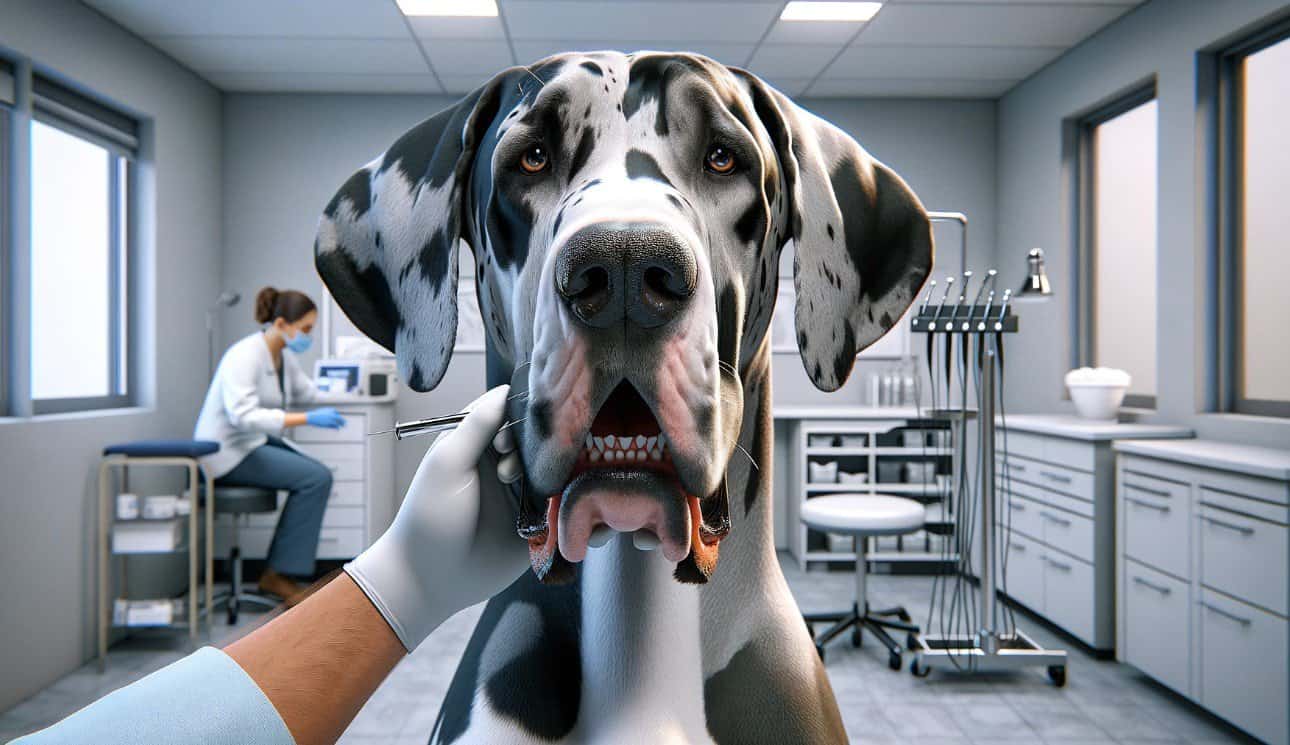
Great Danes, with their majestic stature and gentle nature, deserve the best care we can provide. However, their large size can sometimes make dental care a bit challenging. But don’t worry, I’m here to guide you through it. Whether you’re dealing with “Great Dane Teeth Cleaning” or more serious “Great Dane Tooth Problems”, I’ve got your back. So, let’s embark on this journey to ensure your Great Dane’s pearly whites stay healthy and strong!
Signs of Dental Disease in Great Danes
As a holistic veterinarian and a dog parent, I’ve seen firsthand how dental health can impact a dog’s overall wellbeing, and it’s no different for Great Danes. In fact, due to their large size and unique genetics, Great Danes can be particularly susceptible to certain dental health issues. Knowing the signs of dental disease is the first step in ensuring your Great Dane enjoys a lifetime of good oral health.
One of the most common signs of dental disease in Great Danes is bad breath. While occasional bad breath can be normal, especially after eating certain foods, persistent bad breath can be a sign of periodontal disease. This is a condition where bacteria and tartar build up on the teeth and gums, causing inflammation, pain, and even tooth loss if left untreated.
Another sign of dental disease in Great Danes is a change in eating or chewing habits. If your Great Dane is suddenly reluctant to eat, or if they’re eating on one side of their mouth, it may be due to dental pain. Additionally, excessive drooling, blood in the saliva, or a noticeable decrease in appetite can also be signs of dental issues.
It’s also important to regularly check your Great Dane’s mouth for visible signs of dental disease. Look for yellow or brown discoloration on the teeth, swollen or bleeding gums, or broken or loose teeth. These can all be signs of serious dental health issues that require immediate attention.
As a dog parent, you know your Great Dane better than anyone else. If you notice any changes in their behavior, eating habits, or oral health, it’s always best to consult with a veterinarian. Early detection and treatment of dental disease can prevent more serious health problems down the line, and can help your Great Dane live a long, happy, and healthy life.
Remember, dental health is a vital component of overall health for your Great Dane. By keeping an eye out for these signs and symptoms, you can help ensure your furry friend maintains a healthy smile for years to come.
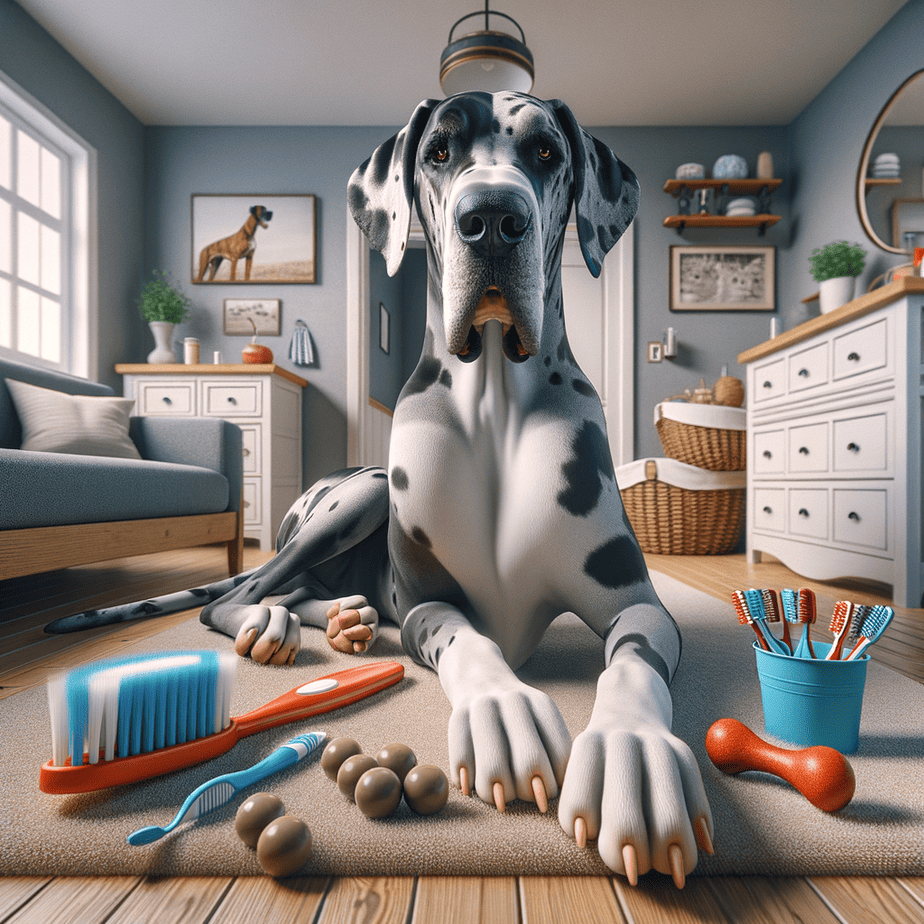
Common Dental Health Issues In Great Dane
As a veterinarian, I often come across various dental health issues in Great Danes. Understanding these can help you maintain your Great Dane’s dental health and prevent serious problems from developing. Here are some common issues:
- Periodontal Disease: This is a common dental issue in Great Danes and all dog breeds. It starts with plaque buildup on the teeth, which hardens into tartar. If left untreated, it can lead to gum disease and tooth loss. Regular teeth cleaning is essential to prevent periodontal disease.
- Broken Teeth: Great Danes are large, active dogs, and they love to chew. This can sometimes lead to broken or fractured teeth. Broken teeth can be very painful and can lead to infections if not treated promptly.
- Tooth Decay: Just like in humans, tooth decay can occur in dogs too. It’s caused by bacteria in the mouth that feeds on sugars in the food your dog eats. This produces acid that can damage the tooth enamel, leading to cavities.
- Oral Tumors: Although not as common, oral tumors can occur in Great Danes. These can be benign or malignant and should be checked by a vet as soon as possible.
Regular check-ups and a good oral hygiene routine can help prevent these issues and keep your Great Dane’s dental health in top shape. Remember, your Great Dane’s dental health is a crucial part of their overall health and well-being.

Conventional Dental Health Treatments
When it comes to maintaining your Great Dane’s dental health, there are several conventional treatments you can consider.
Anesthetic Dental Cleanings
One of the most common treatments is anesthetic dental cleanings. This procedure involves putting your Great Dane under anesthesia and thoroughly cleaning their teeth and gums. This process removes any plaque or tartar build-up, which can lead to more serious dental issues if left untreated.
While this treatment is often effective, it’s important to remember that anesthesia can carry risks, especially for larger breeds like Great Danes. Always consult with your vet before choosing this option.
Potential Individual Health Obstacles
Every Great Dane is unique, and certain individual health obstacles could impact their dental care. For instance, Great Danes prone to heart problems may face increased risks with anesthesia. Similarly, those with drug sensitivities might have adverse reactions to the medications used during dental procedures.
Seizures can also be a concern, as stress from dental procedures might trigger an episode in dogs with this condition. Lastly, age is a significant factor. Extreme age can make dental procedures more risky, and older Great Danes may require more frequent and intensive dental care.
In all these cases, it’s crucial to have open conversations with your vet about your Great Dane’s overall health and how it may affect their dental care. Regular check-ups can help catch potential problems early, and a personalized care plan can ensure your Great Dane’s dental health is as good as it can be.
Remember, maintaining your Great Dane’s dental health is an essential part of their overall well-being. By understanding the conventional treatments available and the potential individual health obstacles your dog may face, you can make informed decisions about their dental care.
Dr. Candy’s Holistic Approach To Oral & Dental Health
As a veterinarian, I’ve seen firsthand the impact that diet and proper care can have on a Great Dane’s dental health. It’s not just about brushing their teeth regularly – although that’s certainly important. It’s also about what they’re eating, and how that food contributes to their overall oral health.
Diet – Low Carbs, Avoid Added Sugars, Enzymes In Fresh Food
The first step in a holistic approach to your Great Dane’s dental health is to look at their diet. A diet that is low in carbohydrates and avoids added sugars is key.
- Carbohydrates, especially those found in processed dog foods, can turn into sugar in your dog’s mouth, promoting the growth of harmful bacteria.
- Added sugars are just as bad, if not worse. Not only do they contribute to tooth decay, but they can also lead to obesity and other health problems.
- Enzymes found in fresh food can help to naturally clean your Great Dane’s teeth. Foods like raw carrots and apples can act as natural toothbrushes, scrubbing away plaque and tartar as your dog chews.
By feeding your Great Dane a diet that’s high in fresh, whole foods and low in processed carbs and sugars, you can help to maintain their oral health and avoid many common dental problems.
Oral Health Specific Probiotics
Another important aspect of a holistic approach to your Great Dane’s dental health is the use of probiotics specifically designed for oral health. These probiotics, like Probiora for Dogs, work by promoting the growth of beneficial bacteria in your dog’s mouth.
- These beneficial bacteria can help to crowd out harmful bacteria, reducing the risk of dental disease.
- They can also help to freshen your dog’s breath, making those kisses even more enjoyable!
Probiotics are a safe and natural way to support your Great Dane’s dental health. They can be easily added to your dog’s food or water, making them a simple addition to your dog’s daily routine.
Remember, your Great Dane’s dental health is an important part of their overall health. By taking a holistic approach, focusing on diet and the use of oral health specific probiotics, you can help to ensure that your Great Dane’s teeth stay healthy and strong for years to come.
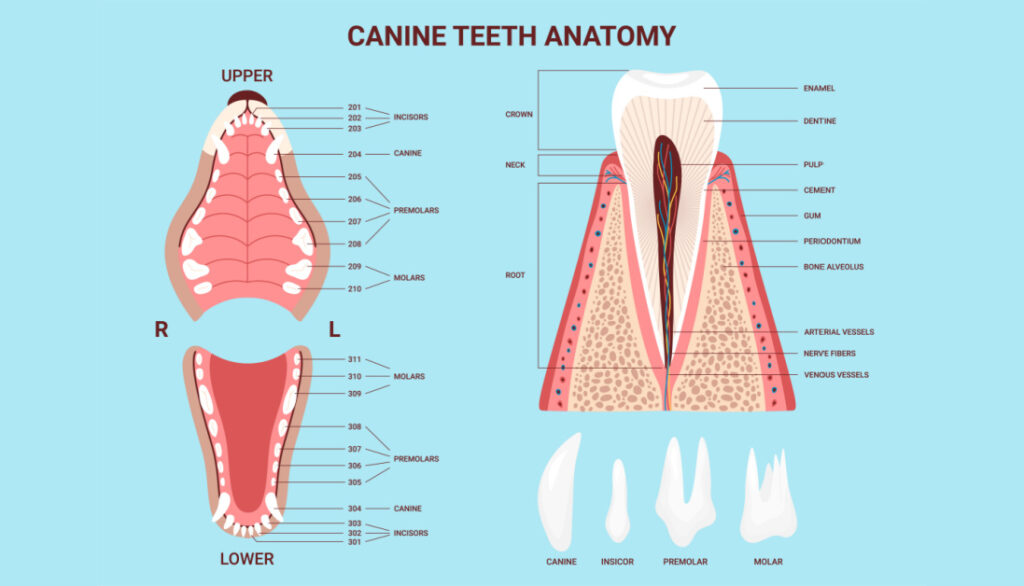
Commercially Promoted Dental Chews: A Failed Promise
As a dog parent, it’s crucial to understand the importance of dental health for your Great Dane. Unfortunately, not all dental chews and products on the market are beneficial for your furry friend. In fact, many commercially promoted dental chews fail to provide the necessary oral health benefits they promise.
Many dental chews that are heavily advertised often contain artificial ingredients, colors, and preservatives. These can be harmful to your dog’s overall health and do not effectively clean your dog’s teeth or freshen their breath. Moreover, some chews are too hard and can cause tooth fractures, while others are too soft and do not provide enough abrasion to remove plaque.
Another commonly promoted product for canine dental health are drinking water additives. While these may seem like a convenient solution, they can actually harm the beneficial bacteria in your dog’s gut, disrupting their digestive health.
Dr. Candy’s Recommended Dental Chews & Products
When it comes to your Great Dane’s dental health, natural, single-source proteins are the way to go. They not only provide the necessary abrasion to clean your dog’s teeth but are also healthy and safe for your dog to consume. Here are Dr. Candy’s top recommendations:
Tendons
Tendons are a fantastic natural chew for your Great Dane. They are tough and fibrous, which helps to scrape off plaque and tartar from your dog’s teeth. Plus, they are a good source of protein and collagen, promoting good joint health.
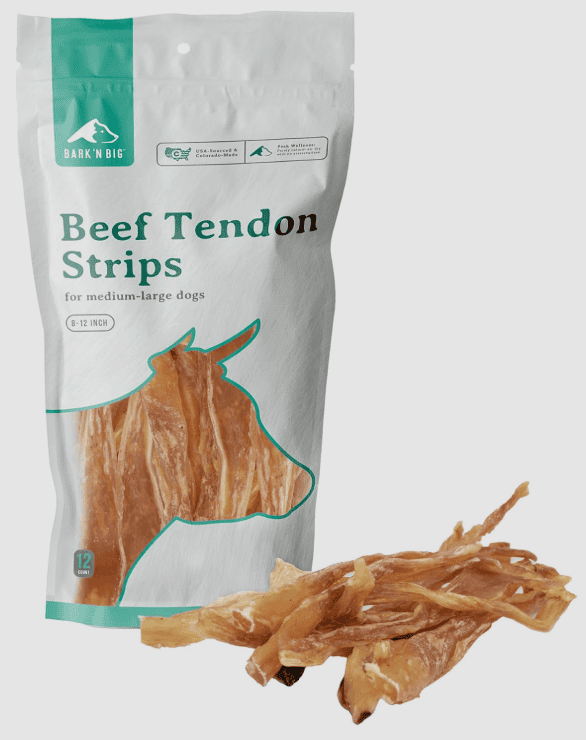
Raw Marrow Bones
Raw marrow bones are another excellent choice for maintaining your Great Dane’s dental health. They are a natural source of calcium and phosphorus, which are essential for healthy teeth and bones. Furthermore, the act of gnawing on bones can help to clean your dog’s teeth and gums.
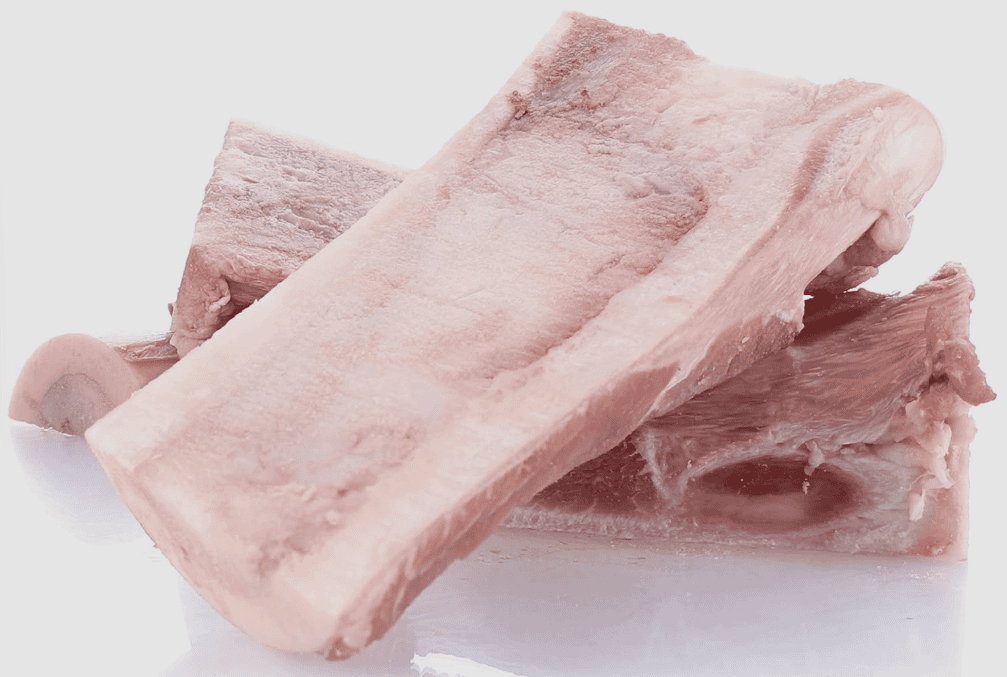
Bully Sticks
Bully sticks are made from 100% beef muscle, providing a natural and digestible chew for your Great Dane. They can effectively remove plaque and tartar and are a good source of protein. However, always supervise your dog while they’re chewing on a bully stick to prevent any choking hazard.

Remember, while these chews and products can help maintain your Great Dane’s dental health, they should not replace regular teeth cleanings and check-ups with your vet. Proper Great Dane dental health involves a combination of home care and professional care to ensure your dog’s mouth stays healthy and clean.
Frequently Asked Questions
1. How often should I brush my Great Dane’s teeth?
It is recommended to brush your Great Dane’s teeth at least 2-3 times a week to maintain good oral hygiene. Regular brushing helps prevent plaque and tartar buildup, which can lead to bad breath and dental diseases.
2. What kind of toothpaste should I use for my Great Dane?
When brushing your Great Dane’s teeth, always use a toothpaste specifically formulated for dogs. Human toothpaste contains ingredients that can be harmful if swallowed by dogs. Dog toothpaste comes in various flavors and is safe for them to ingest.
3. Are dental chews effective in freshening my Great Dane’s breath?
Yes, dental chews can help freshen your Great Dane’s breath. Chewing on dental treats or toys promotes saliva production, which helps reduce bacteria in the mouth. Additionally, some dental chews are designed to remove plaque and tartar, contributing to better oral health and fresher breath.
4. Can I use mouthwash to improve my Great Dane’s breath?
No, you should not use human mouthwash or any oral rinses on your Great Dane. These products contain ingredients that can be toxic to dogs if ingested. It is best to consult with your veterinarian for safe and effective breath freshening options for your Great Dane.
5. What signs should I look for to identify dental problems in my Great Dane?
Some common signs of dental problems in Great Danes include bad breath, swollen or bleeding gums, yellow or brown teeth, difficulty chewing, pawing at the mouth, and a decrease in appetite. If you notice any of these signs, it is important to schedule a dental check-up with your veterinarian.
